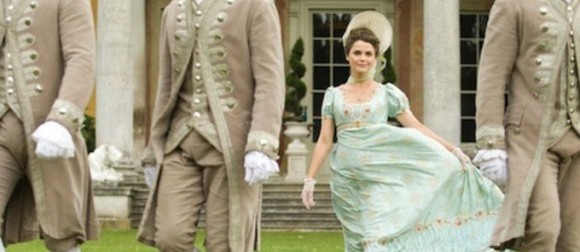The newest film from Jerusha Hess (co-writer of Napoleon Dynamite) and Sony Pictures Classics is called Austenland, and is basically about women LARPing Jane Austen-worthy scenarios. Sounds awesome, right?
Then why am I side-eyeing this project like there’s no tomorrow? It’s written and acted and produced by women, about women. I’m a feminist, so shouldn’t I be happy? Why does the film’s marketing strategy make me want to gag? Head under the cut for the answer.
Plot summary from the film’s website:
A romantic comedy about 30-something, singe Jane Hayes, a seemingly normal young woman with a secret: her obsession with all things Jane Austen. But when she decides to spend her life savings on a trip to an English resort catering to Austen-crazed women, Jane’s fantasies of meeting the perfect Regency-era gentleman suddenly become more real than she ever could have imagined.
The issue I take with this movie’s representation of women has nothing to do with the content, but rather the marketing mindset. I haven’t seen the film and have no grounds to critique the details of the movie itself. However, listening to the way in which SPC is getting vocal about Austenland being a “women’s” film makes me wonder what, exactly, they mean by “women.”
The way that the media surrounding the situation sounds, they mean “women-the-completely-homogenous-group-who-will-all-like-the-same-thing-because-they-are-women.” This marketing assumes that ALL women want to watch period reenactments and romantic stories and pretty dresses, that there is no variation in taste. This also, by extension, assumes that all men who are “real men” won’t be interested in those same things because that’s not “what men like.”
Here’s what raised our eyebrows:
[SPC] has begun a series of word-of-mouth screenings and events for women only. “It’s not like we’re going to have guards at the door throwing men out,” says SPC co-president Tom Bernard. “But I think everyone will get the message based on the invitations.”
Can you see why I’m not happy about this?
Furthermore, I’d bet my frilly pink garters that the “women” this movie is hoping to attract falls less under “anyone who consider themselves a woman” and more under “white upper-middle-class cisgendered heterosexual women.” So, you know, still not all women.
Also, just in case you needed another red flag, Stephenie Meyer is a producer on the film. Yes, that Stephanie Meyer. The one who wrote a scene between two of her romantic leads in which the woman continually says no and makes moves to get away, and the man being portrayed as desirable and good doesn’t listen and continues to kiss her against her actively-stated will (this Racialicious article has the passages in question and great analysis thereof). You know, that bastion of feminism.
The cherry on top of the whole scenario is that the film’s marketing is acting as though they are beacons of empowerment, and that by excluding men from their audience they are drawing the cause forward into a glorious girl-power future. The entire venture echoes hollow, a superficial effort that falls apart at the seams as soon as you go farther than skin-deep into the mentality behind the strategy.
Marketing to women doesn’t have to be forced. Take a look at the comments on the Austenland trailer we posted not too long ago. Everyone was so excited because they loved Jane Austen and the movie looked like a fun time. That was with nothing more than word-of-mouth and a standard film trailer. No exclusionary tactics needed.
We need more women in film. We need more women on the screen and behind the camera and writing the scripts and producing the work, and we need women who are willing to put themselves and their ideas out into the world. We need women of all backgrounds and sexualities and genders, of all races and all strata.
What we don’t need is a production company telling women who we are, what we like, and who we are supposed to be.
(via Indiewire and Hollywood Reporter)
Are you following The Mary Sue on Twitter, Facebook, Tumblr, Pinterest, & Google +?








Published: Jul 22, 2013 02:00 pm